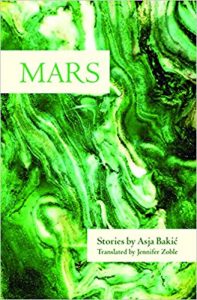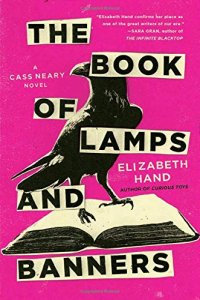Ian Mond Reviews Mars by Asja Bakic
 Mars, Asja Bakic (The Feminist Press 978-1-936-93248-1, $16.95, 167pp, tp) March 2019.
Mars, Asja Bakic (The Feminist Press 978-1-936-93248-1, $16.95, 167pp, tp) March 2019.
I generally don’t draw up New Year’s resolutions (I know how lazy I am), but in 2019 I’m making a concerted effort to read and review more speculative fiction in translation. The first cab off the rank is Mars, a collection of stories by the Bosnian writer, poet, and translator Asja Bakic. Originally released by the Croatian publisher Sanford in 2015, the book has been translated by Jennifer Zoble into English for The Feminist Press.
Academic Ellen Elias-Bursac concludes her Afterword to Mars with an excellent summation of Bakic’s fiction:
Each of these stories is different – some narrated in the first person, other with greater distance – but all have in common their inquisitive, exploratory protagonists who are trying to puzzle out, along with us readers, exactly what is going on in these worlds that don’t, yet do, make sense.
As Elias-Bursac notes, there’s a variety to the 11 stories collected in Mars, both in terms of the perspective and, more interestingly, the tone and subject matter. For example, the book begins with “Day Trip to Durmitor” a delightfully absurd tale involving the afterlife. It’s followed, though, by a dark fable (“Buried Treasure”) about the sinister Zoran who drills wells for the villagers with a visage and laugh that reminds the local children of a monster who “drags you to the depths of the icy lake.” The change in tone is starker with “Heading West”, a harrowing tale concerning a family desperate to flee their ruined country. Where “Day Trip to Durmitor”, with its gags about death, literature, and zombies, is genuinely funny, “Heading West” is a gut punch of a story, two children playing with non-existent toys, pretending to eat sumptuous meals while their mother burns books for heat: “Instead of being devoured by curious children, [the books are] being devoured by flames.”
Elias-Bursac is also spot on when she notes that many of Bakic’s characters exist in a state of bewilderment. The titular “Abby” appears to have lost her memory, and yet she knows there’s something not quite right about her protective, suspicious husband who keeps her trapped at home and always serves her shellfish. Milan, the protagonist of “Carnivore”, can’t explain why he’s drawn to the siren-song of a woman who smells of raw meat. In “Passions” a famous literary writer is caught off guard when she’s mistaken for writing a pseudonymous novel. What I found impressive was how Bakic keeps these stories engaging and accessible even if she doesn’t always resolve the character’s sense of confusion or dislocation.
What’s also striking about the collection is Bakic’s devotion to the written word as an art-form and a creative force. In the aforementioned “Day Trip to Durmitor” great literature can generate a rift between the worlds of the dead and the living. Echoes of this idea can be found in the cynical yet humorous”The Underworld”, where the discovery of a reality-altering alien artefact on Earth powered by “authorial imagination” compels the authorities to exile the world’s “literary refuse” to Mars. Creativity, of a more primal and sexual kind, is at the heart of “Asja 5.0”, where Bakic, inserting herself into the narrative, is commissioned, Anais Nin style, to write erotica for Kreanga, a wealthy individual who hopes to be “the first man to achieve an erection in god knows how many years.” Asja, together with her five clones – this is the first story I’ve ever read that combines erotica with genetic engineering – band together to escape Kreanga’s sex-crazed clutches.
Although these stories were published a few years ago, there’s an immediacy to Bakic’s offbeat worldview, sometimes strange and surreal, sometimes terrifying and upsetting, that pairs perfectly with the madness of the current political moment. Kudos then to Feminist Press and Jennifer Zoble for publishing and translating these wonderful, surprising stories. I hope we get to see more of Asja Bakic’s work in English. I’ll certainly be reading it.
This review and more like it in the February 2019 issue of Locus.
 While you are here, please take a moment to support Locus with a one-time or recurring donation. We rely on reader donations to keep the magazine and site going, and would like to keep the site paywall free, but WE NEED YOUR FINANCIAL SUPPORT to continue quality coverage of the science fiction and fantasy field.
While you are here, please take a moment to support Locus with a one-time or recurring donation. We rely on reader donations to keep the magazine and site going, and would like to keep the site paywall free, but WE NEED YOUR FINANCIAL SUPPORT to continue quality coverage of the science fiction and fantasy field.







